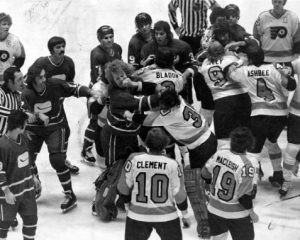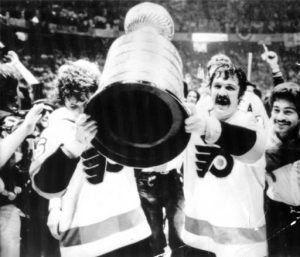The Philadelphia Flyers, an expansion team that joined the National Hockey League (NHL) in 1967, are famously known as the “Broad Street Bullies.” This moniker, synonymous with aggressive and intimidating hockey, emerged during the 1972-73 season, defining an era of Flyers hockey characterized by physicality and unprecedented success. This team not only filled arenas but also captured the hearts of Philadelphia, becoming a legendary part of the city’s sporting history.
 Philadelphia Flyers players engaged in a violent altercation on the ice with the Vancouver Canucks in 1973, showcasing the Broad Street Bullies' notorious style of play.
Philadelphia Flyers players engaged in a violent altercation on the ice with the Vancouver Canucks in 1973, showcasing the Broad Street Bullies' notorious style of play.
From Expansion Team to “Broad Street Bullies”
Initially, the Philadelphia press sought a catchy nickname to encapsulate the Flyers’ increasingly physical style of play. After a particularly rough 3-1 victory against the Atlanta Flames, sportswriters Jack Chevalier and Pete Cafone of the Philadelphia Bulletin coined the perfect phrase: “Broad Street Bullies.” The name resonated instantly, reflecting the team’s location – their home arena, the Spectrum, was situated on Broad Street – and their intimidating on-ice demeanor. More than just a colorful nickname, it became a badge of honor for a team that was rewriting the narrative of NHL hockey.
The Flyers were meticulously assembled through strategic acquisitions, including the 1967 Expansion Draft, amateur drafts, free agency, and shrewd trades. Key figures like Gary Dornhoefer, Bernie Parent, and Ed Van Impe were early picks from the Expansion Draft. Later, amateur drafts brought in iconic players such as Bobby Clarke, Don Saleski, Dave “The Hammer” Schultz, and Bill Barber. A pivotal trade brought Rick MacLeish to Philadelphia, sending Parent temporarily to the Toronto Maple Leafs before his return.
Bobby Clarke quickly rose to prominence, becoming the heart and soul of the Broad Street Bullies. Renowned for his leadership and skill, Clarke earned the NHL’s Most Valuable Player award three times (1973, 1975, and 1976) and was celebrated for his sportsmanship, despite the team’s tough reputation. Dave Schultz, true to the “Bullies” image, became the team’s enforcer, amassing penalty minutes at an unprecedented rate. In the 1974-75 season, Schultz set an NHL record for penalty minutes, further cementing the team’s physical identity.
Stanley Cup Championships and Philadelphia Hockey Mania
Beyond the brawls and penalty minutes, the Broad Street Bullies were a winning machine. A unique element of their home games was the tradition of playing Kate Smith’s rendition of “God Bless America.” For the 1973 season opener, Smith herself performed live, seemingly ushering in an era of good fortune. The Flyers finished the season with an impressive 50-16-12 record, setting the stage for their historic playoff run.
 Philadelphia Flyers captain Bobby Clarke and star goalie Bernie Parent triumphantly raise the Stanley Cup in 1974, marking a historic moment for the team and the city of Philadelphia.
Philadelphia Flyers captain Bobby Clarke and star goalie Bernie Parent triumphantly raise the Stanley Cup in 1974, marking a historic moment for the team and the city of Philadelphia.
In 1974, the Flyers navigated a challenging playoff bracket, defeating the Atlanta Flames, New York Rangers, and Boston Bruins to claim their first Stanley Cup. Bernie Parent, who had returned to the Flyers in 1972, was awarded both the Conn Smythe Trophy as playoff MVP and the Vezina Trophy as the league’s best goaltender. Coach Fred Shero, the mastermind behind the Broad Street Bullies’ system, was recognized as the league’s top coach with the Jack Adams Award. This victory was monumental; the Flyers became the first expansion team to ever win the Stanley Cup, sparking a massive celebration with two million fans lining Broad Street for the victory parade.
The following season, 1974-75, saw the Flyers maintain their dominance. They once again topped their division and stormed through the playoffs, defeating the Toronto Maple Leafs, New York Islanders, and Buffalo Sabres to secure their second consecutive Stanley Cup. The Broad Street Bullies had solidified their place as a hockey dynasty. Another massive parade, this time with 2.5 million attendees, shut down Broad Street in celebration. Parent again earned both the Conn Smythe and Vezina Trophies, while Clarke was awarded the Hart Trophy as MVP, underscoring their individual brilliance within the team’s collective success.
The End of an Era and Lasting Legacy
While the Flyers remained competitive for several years, reaching the Stanley Cup Finals in 1976, the Broad Street Bullies era began to wane. The trade of Dave Schultz in 1976 and the departure of Fred Shero in 1978 marked a shift. Although the Flyers continued to reach the Stanley Cup finals in subsequent decades (1980, 1985, 1987, 1997, and 2010), they never quite recaptured the intimidating aura and consistent championship success of the mid-1970s Bullies.
The legend of the Broad Street Bullies endured, immortalized in the 2010 HBO documentary Broad Street Bullies, narrated by Liev Schreiber. The documentary provided a nostalgic look back at this iconic team, reminding a new generation of their impact. The Hockey Hall of Fame has enshrined several key figures from this era: Bernie Parent (1984), Bobby Clarke (1987), Bill Barber (1990), and Fred Shero (2013), solidifying their individual contributions to the Broad Street Bullies’ enduring legacy.
The Broad Street Bullies remain a captivating chapter in NHL history. They were more than just a team; they were a cultural phenomenon that embodied the spirit of Philadelphia – tough, resilient, and fiercely passionate. Their blend of physicality and skill not only brought Stanley Cups to Philadelphia but also left an indelible mark on the sport of hockey, forever defining an era of fearless, hard-nosed play.


